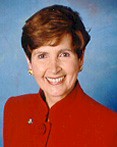
Morella
(R-MD)
House Subcommittee Holds Hearing on Broadband Wireless
Internet
(April 14, 2000) The House Technology Subcommittee held a hearing on broadband wireless Internet technologies on Thursday morning, April 13. Witnesses from wireless companies described their technologies, and offered policy recommendations, including encouraging market-driven standards, free trade, removing the spectrum cap, making more spectrum available, and providing for forced access to multi-unit dwellings.
The subcommittee heard from four industry witnesses:
Each of the witnesses described his company's wireless technologies currently being used to provide Internet access, and plans for deployment of faster services in the future. They also identified what the government can do to further the development of broadband wireless Internet.
The House Science Committee's Subcommittee on Technology has oversight jurisdiction over the NIST, but not the Federal Communications Commission or NTIA. Hence, Rep. Connie Morella (R-MD), the Chairman of the Technology Subcommittee, made reference to the role of NIST. However, the policy recommendations of the witnesses quickly focused on FCC and NTIA activity.
 |
|
| Rep. Connie Morella (R-MD) |
Rep. Morella stated that "right now 98% of all homes are not wired for broadband Internet service. And this is not just a rural or inner city problem."
"Wireless technologies could help bridge this gap and provide broadband Internet areas lacking the infrastructure for wired access."
The lead off witness was Irwin Mark Jacobs, Chairman and CEO of Qualcomm. He was introduced by Rep. Brian Bilbray (R-CA), who said that Jacobs is to wireless telephone what Bell was to the original telephone. Incidentally, Qualcomm is located in San Diego, which Rep. Bilbray represents.
Jacobs stated that there are several things Congress can do. First, it can help provide access to foreign markets. He continued that "governments restrict the choice of digital technologies available to wireless operators. It is important that Congress remain vigilant in support of open markets and technology neutrality." He also advocated granting permanent normal trade relations status to China.
Second, he advocated "a level playing field" between landline and wireless broadband technologies. "There are currently a dozen or so 'broadband' bills circulating in Congress, and our review of these indicates that they treat landline and wireless broadband services the same." He encouraged such an approach.
Third, he advocated federal basic research funding for information technology, and wireless in particular.
| Related Story: House Passes Bill to Restrain FCC on Low Power FM, 4/13/00. |
Jacobs stated that in the near future kids would use inexpensive cell phones with broadband Internet capability to listen to music served by IP. Ironically, on the same day the Dr. Jacobs testified, the FCC was defending its initiatives to promote diverse content delivery via plain old fashioned broadcast radio technology. (The House passed a bill later in the day which limited the FCC's power to issue new categories of low power FM radio licenses. The House Telecom Subcommittee also held a hearing on broadcast content regulation by the FCC.)
Rep. Cliff Stearns (R-FL), who participated in the Telecom Subcommittee hearing, which was down the hallway from the Rep. Morella's Technology Subcommittee hearing. He pointed out that the computer industry has no FCC to regulate it, and hence, it is more innovative.
Richard Lynch, EVP and CTO of Verizon Wireless, discussed spectrum policy. "To facilitate the development of wireless Internet and other broadband services in the interim, policymakers should ensure that spectrum management policies are market driven and promote the most efficient use of spectrum. For example, spectrum caps that limit mobile operators to 45 MHz of spectrum in a particular market should be eliminated. These restrictions unnecessarily constrain access to valuable spectrum resources, and impede the delivery of broadband wireless services."
Verizon currently only provides slow wireless Internet access via CDPD and CDMA service. However, Lynch argued that "relief from the spectrum cap will enable operators to acquire the spectrum necessary to begin deploying broadband wireless services including wireless Internet access."
Timothy Graham, General Counsel and EVP of Winstar, a facilities based broadband Internet provider which is deploying line-of-sight technology, addressed two policy issues. First, "internationally, many countries have not yet invoked policies which make sufficient blocks of area-wide blocks of spectrum available."
Second, Winstar wants access to the roof tops of apartment buildings. "Federal legislative and regulatory action is the key to unlocking access to competitive telecommunications services for millions of Americans nationwide. Without support for bipartisan bills like HR 3487 and HR 2891, which support national processes for securing non-discriminatory access to buildings, it will take decades to reach consumers in the United States that desperately need access to broadband technologies."
| Related Story: House Subcommittee Considers FCC Authority to Take Property, 3/22/00. |
Of course, building owners see the issue differently, and have argued that any such regulation or statute would provide for uncompensated takings in violation of the Fifth Amendment of the Constitution.
Paul Fulton, VP and GM of 3Com's Wireless Connectivity Division, stated that it is important "that government not undermine privately crafted standards by ill-advised and sudden changes to rules that have guided years of research."
He stated that US industry has developed the 802.11 standard for wireless LANs, but "the FCC is considering rules that would undermine this new industry. At the behest of one or two companies, it is considering changes to its rules that will permit other wireless devices to interfere with the operation of the 802.11 devices."
The members of the subcommittee who participated in all or part of the hearing included Connie Morella (R-MD), James Barcia (D-MI), Brian Baird (D-WA), Roscoe Bartlett (R-MD), Gil Gutkneckt (R-MN), Lynn Rivers (D-MI), and David Wu (D-OR). In addition, Brian Bilbray (R-CA), who is not a member of the subcommittee, was allowed to participate.